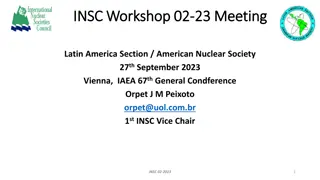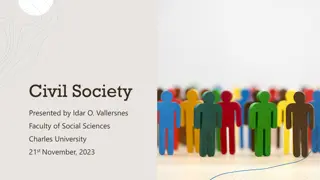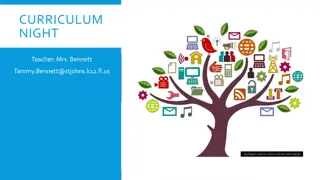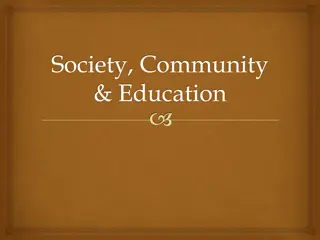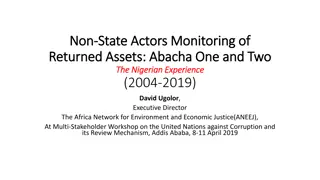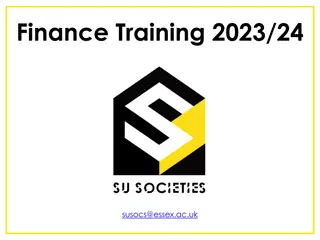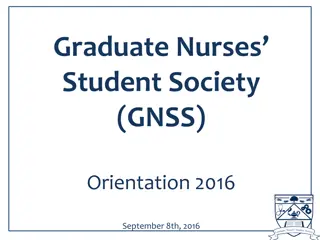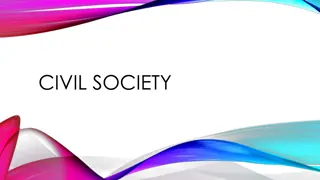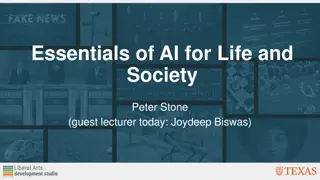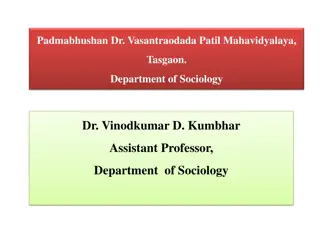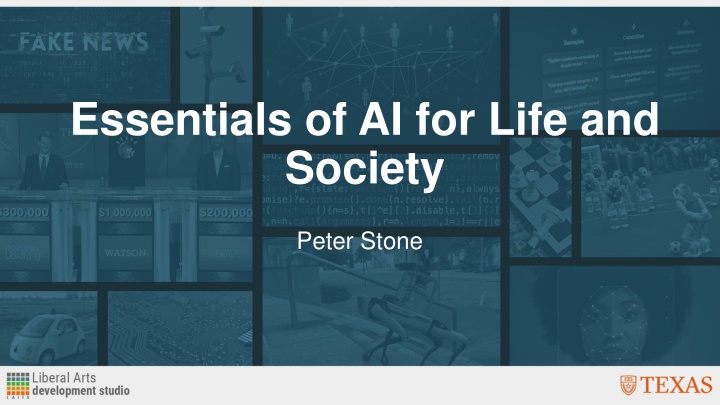
Essentials of AI for Life and Society
Artificial Intelligence (AI) is defined as a science and set of computational technologies inspired by human nervous systems for sensing, learning, reasoning, and action. It goes beyond deep learning to encompass various areas like RL, NLP, vision, planning, and more. The field covers AI paradigms, societal implications, and its relationship with Computer Science. Challenges arise in defining thinking and understanding in machines, while weak AI involves intelligent computer actions and strong AI delves into the possibility of computers thinking. Explore the diverse facets of AI and its impact on society.
Download Presentation

Please find below an Image/Link to download the presentation.
The content on the website is provided AS IS for your information and personal use only. It may not be sold, licensed, or shared on other websites without obtaining consent from the author. If you encounter any issues during the download, it is possible that the publisher has removed the file from their server.
You are allowed to download the files provided on this website for personal or commercial use, subject to the condition that they are used lawfully. All files are the property of their respective owners.
The content on the website is provided AS IS for your information and personal use only. It may not be sold, licensed, or shared on other websites without obtaining consent from the author.
E N D
Presentation Transcript
Essentials of AI for Life and Society Peter Stone
Computational Foundations and Future Directions
Defining Artificial Intelligence A science and a set of computational technologies that are inspired by, but typically operate quite differently from, the ways people use their nervous systems and bodies to sense, learn, reason, and take action NOT one thing More than just deep learning RL, NLP, vision, planning, symbolic reasoning, algorithmic game theory, computational social choice, human computation Getting Computers to do the things they can't do yet Once it works, it's engineering
Some Context We ve covered AI Paradigms and Applications: Planning and Search; Probabilistic Modeling; Machine Learning Intelligent Robotics; Computer Vision; NLP Then societal implications: Bias and fairness; Mis/disinformation; Workplace, Economics, and Policy; Alignment and Existential Threats Closing with some higher-level context on the relationship with the field of Computer Science And a bit of philosophy and looking forward...
Thinking Remzy : I think a lot from what we've learned is that we are having trouble defining what thinking is, and how can we apply the definition to machines. ... At the end of the day, we don't fully understand the human brain enough to define how we think, or what thinking in general is, to be able to differentiate our current AI models like ChatGPT from us.
Understanding Abubakar : How can we define understanding in a machine, and is it actually comparable to human comprehension, or is it just an imitation?
Weak vs. strong AI Weak AI: computers can act intelligently Strong AI: computers can actually think Not narrow vs. general
Is it possible to program computers to act as intelligently as Is it possible to program computers to act as intelligently as people? people? - - Yes Yes - - No No
Weak vs. strong AI Weak AI: computers can act intelligently Strong AI: computers can actually think Not narrow vs. general Russell and Norvig: "Most AI researchers take the weak AI hypothesis for granted, and don't care about the strong AI hypothesis."
Turing test Joshua : I would like to learn what Dr. Stone thinks is a near foolproof test to distinguish a human from a robot. Arthur : I'm curious how AI's tendency to "lie" or hallucinate affects this. Would this be a dead giveaway in the current models? Edward - Recent advancements in AI have also given them the capacity to converse with voices nearly indistinguishable to humans. What further advancements will make the Imitation game a more holistic test of indiscernibility? What would a computer need to be able to do to convince you that it can act as intelligently as people? Discuss!
Upper limits MacKena : If AI is accelerating like it is today, where is it going to be in 30+ years? Maria : Will we be able to fully understand what AI is capable of? and until when will we be able to keep growing?
Specialness of Humans Turing: We like to believe that Man is in some subtle way superior to the rest of creation. It is best if he can be shown to be necessarily superior, for then there is no danger of him losing his commanding position. The popularity of the theological argument is clearly connected with this feeling. It is likely to be quite strong in intellectual people, since they value the power of thinking more highly than others, and are more inclined to base their belief in the superiority of Man on this power. Galileo: we re not center of universe Darwin: we re just another animal If we re not the only intelligent entities, what s left to make us special?
AI bioweapons Weston : While it may sound like the plot of a science fiction novel, AI bio-weapons may indeed be an area that requires more attention. While we have yet to see large-scale utilization of biological weapons in conflict contemporaneously, many countries appear to at least have resources devoted to their development and research
Ten Priorities balancing short and long term implications Scientific foundations: understand capabilities and limitations Safety, reliability, and equity Regulation Disinformation Resources: bridge the academia industry gap Vibrancy of academy: mitigate brain drain Jobs and economy Diplomacy: global norms, protect human rights Deep currents: monitory psychological, social, and cultural impacts Catastrophic outcomes: existential threats
My hopes for your AI literacy You know what AI really is (and isn t) beyond ChatGPT You understand the main (possible) societal implications You ve expanded your vocabulary related to AI If you never take another AI (or Comp. Sci.) course again, I provided a useful foundation for your career and your life If you re intrigued to learn more, it drives you to take more in-depth courses
This course will be taught again next year What topics should I have covered that I didn t? What should I have skipped? What should we do differently? (It s OK to also mention things you particularly liked) Discuss!
Next Week: Youre on your own! No more (assigned) readings No more lectures Final project due tomorrow! Please complete both surveys the one assigned in this week s module, and the official university one.



